The 4th Comic Con in Thessaloniki started yesterday with Frank Miller as the guest of honour. I am happy to share with you some of the photos of the first day of the convention.
The 4th Comic Con in Thessaloniki started yesterday with Frank Miller as the guest of honour. I am happy to share with you some of the photos of the first day of the convention.
Quentin Coldwater: So “be a magician”? Is that illegal or are you guys trying to take over the world or…?
Dean Fogg: This school exists for a single and timeless purpose – to reveal your innate abilities and hone them to the highest degree. Now, what you do with it after that is entirely up to you. If you want to take over the world, we don’t teach that, but give it a go.
The Magicians, “Unauthorized Magic”, SYFY (2015)
Hello, once again dear readers of the ComicBook Imperative. It has been a long time since we last interacted. I hope that this new blog post finds everyone good! In this long period of time that I didn’t post anything new to the blog, I had the chance to read and watch a lot of amazing stories that I wanted to share with you. I am sure that most of you are familiar with them, but still I hope that you’ll find my take on these stories interesting. So, as for my comeback story I chose Syfy’s “The Magicians”, based on Lev Grossman’s really successful book trilogy.
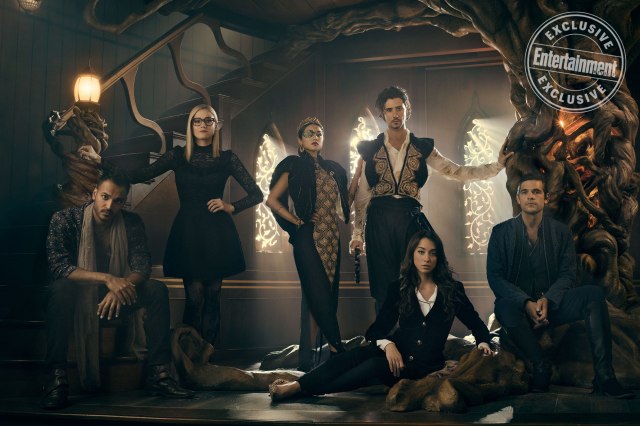
The Magicians, Syfy. From left to right: Penny, Alice, Margo, Eliot, Julia, Quentin.
For starters, the basic premise of “The Magicians” is about the story of Quentin Coldwater who finds himself in an elite magic school, Brakebills University for Magical Pedagogy, where he will be trained as a magician. There he discovers that the fictional world of Filory, from his favorite childhood books, is not fictional, but real and more dangerous than he could ever imagine. At Brakebills, Quentin meets a group of people that will make him challenge everything that he thought was true both about himself and his world. Meanwhile, Quentin’s childhood friend and unrequited love interest, Julia, is denied entry to Brakebills and she decides to search for magic in all the wrong places. Lastly, there is something lurking in the shadows between the worlds, a Beast, and everyone’s time is running out.
This is just the beginning of the wild story of “The Magicians”. In three books and three seasons (a fourth one is coming next year) “The Magicians” explored the spaces the heroes inhabited, but more than that it delved fully and deeply into the characters themselves. Both the books and the TV show were able to address and, to a certain extent, change the rules of what is usually expected from a story that heavily leans on the classic coming off age storyline embedded with fantasy, magic and quests. Lev Grossman, the author of the book trilogy, and Sera Gamble and John McNamara, the creators of the TV series, boldly scrapped the rulebook of the fantasy genre (that is dominated by figures like J. K. Rowling, J. R. R. Tolkien, and C. S. Lewis) giving us a cold, hard look of the reality and perplexity of a world that magic exists. This world is not just beautiful and enchanting and thrilling and full of adventures, but it is also dark and random and mundane and maybe, just maybe, is rooted in the immense pain of the people that live inside it. But the problematic aspect of this world does not lie just in the specifics of magic, but also in the character themselves. We meet the characters at a time when they feel as lost as anyone would feel in their 20s. All of them are charismatic and smart, but that doesn’t change the fact that they have absolutely no idea what to do with their lives. They, also, struggle with their studies, their career prospects, their sex lives, with alcohol, drugs or mental illness. These are all issues that everyone has to face at some point or another. Hence, why all these characters are really relatable. In addition to all these, Quentin and his friends have to find a way to include magic in the already challenging process of growing up. Figuring how everything works out can be a deeply scaring procedure, but it is one that most people experience.
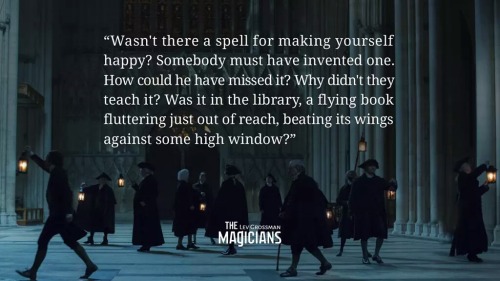
The Magicians, Lev Grossman
The feeling of being lost is accentuated in the world of “The Magicians” due to the lack of villains or wise old men and women that will guide the brave protagonist in order to fulfill a prophesied destiny. The world that “The Magicians” inhabit feels real, because it is really a reflection of the world we live in. In our world, as we get to grow up and, hopefully grow wiser, we get to realize that there are no real villains in our lives and, most likely, no authority, Dumbledore-like, figure to guide our every move so we can stay on path and reach our full potential. We can choose to be good or evil, we can choose the road that leads to comfort or take the path least travelled, but as we get to chose and somewhat “wink it”, the same goes for the ones we seek guidance and advice from. Lev Grossman in his presentation at Google Talks, said: “What if you took away the avuncular adviser figure, which is such a staple of fantasy. You so often have a Gandalf or a Dumbledore or somebody who is there when the main character wonders a little bit off the path or gets confused about what he or she is supposed to be doing, takes them by the shoulders and just says ‘Look, we have this evil ring, it’s a terrible thing and the world is ending, but you see that volcano over there? Just go at the volcano! Put the ring at the volcano and then everything is going to be fine! […] I always felt that there wasn’t nobody in my life in particular who has given me that kind of advice. Or they were, but they were just as full of crap as I was.” And, really, I cannot argue with this assessment. Most of us try to inform our decisions based on what we’ve learned and what we’ve experienced (first-hand or any other way), but at the end of the day we rarely (or ever) get a guiding hand that gives us the opportunity to avoid the big or humiliating mistakes that we will ultimately make. We do not get to have Harry’s assurance that he was walking down the path he was supposed to take from the beginning–and that is probably because there is not a predeterminated path for us to take.
At the same time, Quentin had to face all the hardships of an ever-expanding reality and the terrifying idea that he was not really the chosen one, that he might not be the leading actor in life’s play. The magnificence of “The Magicians” lies in that fact; Quentin may be our way into that world, but as the story progress we get to experience this expanded reality with the addition of more points of view (Julia’s, Alice’s, Eliot’s, Margo’s etc.). Quentin soon realizes that he is not the smartest or the most talented or the chosen one for the adventure he always craved for. His friends become more real and tangible people with just as complex emotions, struggles and desires as Quentin gives them more and more space. And as he is learning that, we get to observe this wider world where not everyone gets what they deserve. A prime example is Julia, who must be one of the most fascinating characters Lev Grossman created (it is interesting to note that behind Grossman’s inspiration for Julia is another Harry Potter character, that of Dudley Dursley). Quentin, by no means, is another Harry or Frodo. And for all of us that grew up in the Harry Potter fever of the late 1990s and 2000s it is easy imagining ourselves as the chosen, the ones above everyone else, the ones that get to have all the excitement and quests. Every other person in our lives could easily get Ron Weasley-ed, being at best a supporting and often one-dimensional character that serves as a mean for us to express our emotions or set our plans in motion (for example, by introducing a villain of the likes of Lord Voldemort or Sauron, the main character finds the necessary driving force in order to embark on the adventure of a lifetime or love interests and friendships sometimes are there just as a way to reflect the feelings of the main character, without much else to offer).
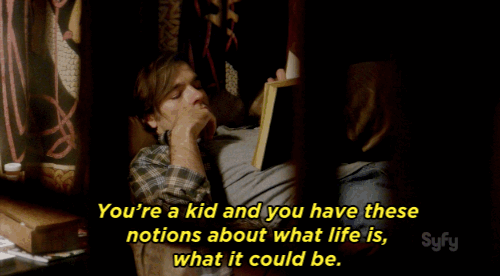
The Magicians, Syfy. Quentin reading Filory and Further.
But as much as any of us identifies with Harry or with Frodo, our lives couldn’t be further away from theirs. Quentin struggles with this idea for a long time. For all of his life he was searching for meaning, something that he couldn’t find in his life before Brakebills, and there he thought he found exactly that. But the disillusionment was not far behind. Quentin’s grapple with mental illness (something that was heavily implied in the books and straightforwardly addressed in the series) caught up with him even in that world he was so passionately wanted to fit in. Even the magical Brakebills couldn’t compete with the allure of Filory, his childhood dream. Quentin cannot “stop looking for the next secret door that is going to lead [him] to [his] real life” and he often has to remind himself to stop waiting. This was his life. There was nothing else. And he had to decide to enjoy it or be miserable wherever he went. Growing up with books like Harry Potter or the Chronicles of Narnia it is easy to imagine that you get to escape from the often mundane everyday life for a world full of magic and wonders. But what Quentin’s story teaches is that even in that magical world everyday life has a way of catching up with you. Magic in the worlds of Brakebills and Filory, however glorious it can be, is also complicated and procedural. It is not just waving your wand, while reciting cool latin phrases. In Grossman’s world, magic was like math and chemistry. You had to know the variables, you had to learn physics and various languages. Magic was organic, a tool, not something completely fantastical. By adopting that perspective, I believe, let Grossman and Gamble and McNamara to make this world more relatable. And, while offered a world to escape to, addressed some serious issues that all of us might get to face at some point or another.
I would love to read what you guys think about “The Magicians”, who are your favourite characters and what are you most excited for the next stories in season 4. As for me, I love Julia, Eliot and Margo! I have to say they are the ones that I am always excited for!
Till the next time,
George
The ComicBook Imperative Guy




Dear readers of The ComicBook Imperative, hello! I am really glad to share with all of you some really great news. Fans of The ComicBook Imperative know that a few months ago I had the opportunity to discuss with an amazing writer and independent comicbook creator, Ryan Little, about his latest work, Lonesomes. I know that you loved Lonesomes as much as I did and the Kickstarter campaign was an absolute hit!
Now, Ryan is coming back with his new work, a completely different work in tone, style and feeling. The name of this work is Prometheus and is a new take and a continuation of the original ancient greek myth. Prometheus is an excellent noir/fantasy take on the myth and it expands it in a really interesting way. The premise of Prometheus is about the Titan that stole the fire of knowledge from the Ancient Greek Gods and gave it to the mortals. This is how the ancient Greeks explained the jumpstart of the civilisation with the discovery of fire. Prometheus‘ hubris against the Gods could not go unpunished. Prometheus was brutally punished by the Gods. Little expands the story bringing Prometheus to the 21st century escaping his everlasting prison. He now has to familiarise himself with a new world that he doesn’t know, come face to face with the Gods that held him captive and find out that the fire of knowledge was stolen. He will embark on a great adventure that I know that I want to follow.
Ryan, in this first chapter of the story, was able to successfully use the material of the original myth and build on it in a really interesting way. Pop culture, the ongoing wars and the financial crisis in different parts of the world set an intriguing and fun premise for Prometheus to explore. The tone and the sketching style is truly complementary of the story and I urge you to check it out!
Follow the link for the Kickstarter campaign, here: Prometheus.
Don’t forget to support independent creators!
George
The ComicBook Imperative Guy
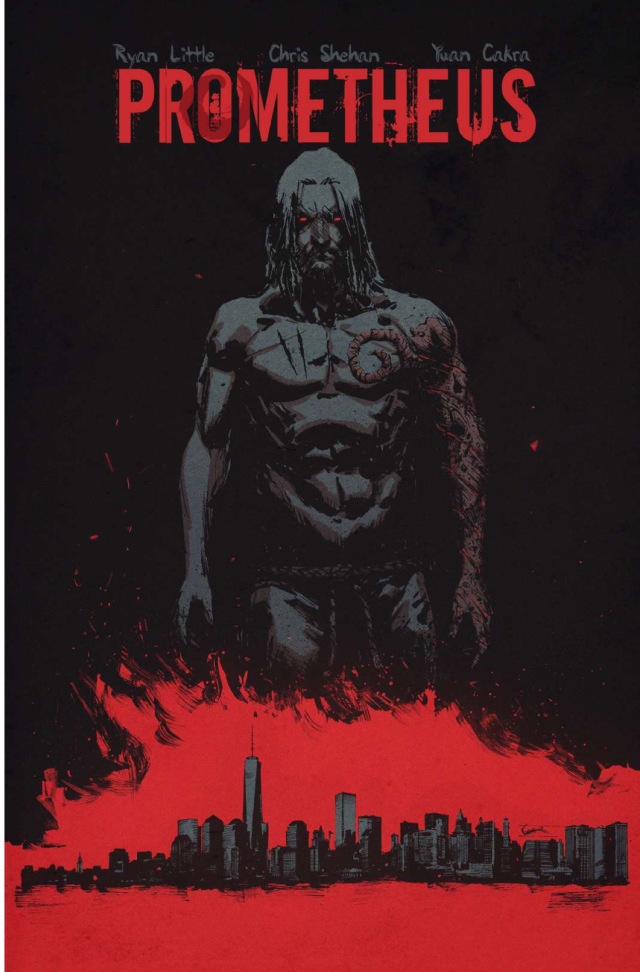
The cover of the 1st issue of Prometheus.
Hello dear readers of The ComicBook Imperative! It has been a great time for anime and video games lovers. Netflix launched the much-awaited series Castlevania. Castlevania is an animated show that is based on the Konami video game franchise with the same name and it revolves around Trevor Belmont who must defend the nation of Wallachia from the evil demons and Dracula himself. Because I do not intend to spoil the fun for all of you that haven’t watched the series yet, my entry will be solely focused on the first episode and the premise that builds the world of Castlevania and it becomes the primary force for the progression of the story.
The story begins at 1455 in Wallachia. The first episode of the series, “Witchbottle”, introduces to the audience a young girl named Lisa who wishes to become a doctor. In order to achieve her deepest desire to help mankind move forward, she seeks and finds Vlad Dracula Tepes in his remote castle. Vlad has advanced scientific and technological knowledge and he becomes amused by Lisa’s straightforward approach and her willingness to risk her life in order to become a doctor. In exchange for his help and guidance, Lisa offers to help Vlad to reconnect with his humanity. Vlad and Lisa’s relationship soon blossoms to something more. 20 years later, Lisa found herself accused of witchcraft and got burned at the stake. Upon her last moments, Lisa cries to Vlad that he should be better than the people that burn her and he should show moral character and help them escape from the mist of ignorance that they live in. Vlad, though, was nowhere near her and never heard her last words. Once he returns to Târgoviște, one of the main cities of Wallachia, and finds out about the fate of his wife, Dracula is devastated and decides to wage a war against every single human being in Wallachia, a war against the Church and the Bishop that ordered his wife to be killed. He emerges from the fires that burned his wife and declares a war that would start a year from that fateful day. Dracula warns the people of Wallachia that they should abandon their land or make peace with their fate if they chose to stay. Another year passes and upon the day of Lisa’s death Dracula keeps his promise and releases hell on earth.
Castlevania is really engaging and a show that urges you to watch more than one episode at a time. The writing is intriguing and both the animation and the music score are excellent. One of the central ideas that I want to discuss in this entry is the idea of religious fundamentalism and how it becomes the driving force of the story. Castlevania is drawing its inspiration from the witch trials and the Medieval Inquisition. The period of witch trials was a time of a widespread panic that derived from the belief that witches were trading their life/soul for power that came from the Devil himself. Many people, mostly women, were wrongly accused of being witches and had to suffer through shameful trials and cruel tortures for non-existent crimes. In this case, of course, it would be an omission not to mention the fact that misogyny played a crucial role during the witch hunts and the trials. The god-fearing man could not be blamed for his dark thoughts and sexual desires, so it must be the object of these desires that invokes these feelings against the will of the virtuous and innocent man. Witches entrapped the virtuous men with the help of spells and charms and potions with the guidance of demons and the Devil, so they should be burned for their crimes. It is interesting to note that these feelings echo even in our society. The idea of victim-blaming and rape-culture [women being accused of being dressed provocatively or being intoxicated as the reason for them being attacked] is somehow prevalent and swifts the focus (and the blame) from the person that commits the crime to the victim.
Going back to the premise of Castlevania though, it is not sexual frustration that is the cause of the witch hunts, but ignorance and religious fundamentalism. The dawn of a civilisation based on freedom and scientific knowledge was deemed as the work of the Devil. The Bishop who orders Lisa’s death to some extent knows that she is not a witch and what he found in her house was nothing more than scientific equipment. And yet, he is more than happy to commit this crime in order to instill fear, control his subjects, get more power. He is creating the problem (or at least he is helping it become even bigger) in order to then stand in front of the crowd and declare that only he alone can fix it. While he is standing and watching Lisa burning, he discusses how the Archbishop was not going to live for much longer and the way he is going about it showcases his desire to usurp his place and hold even more of the power of the Church. While the Mayor suggests that all clerics should be comfortable with the idea of death and joining God’s heavenly kingdom, the Bishop admits that he is more interested in shaping Wallachia as God’s country if only he had the chance to burn down everyone who he thinks poses a threat to his vision or considers evil (which are equivalent in his perspective). The Bishop is using religion and faith in order to gain power, influence and control over the people of Wallachia the same way religious fundamentalists do. Religious fundamentalists demand absolute faith, they reject modern theories that stray from the literal interpretation of scripts, ideologies etc and proclaim the need to return to a long lost blissful state of being that people lost due to their wickedness or some other reason they pose as the original sin. Fundamentalists often reject scientific and technological process as they view the findings as threats to their absolute belief system. Science is deemed unholy and the people that practice it have to be stopped.
Castlevania would be just another show that is inspired by gothic literature and the witch trials if only we lived in a world where fundamentalism was not creeping back in our lives. The world seems to be regressing back to certain ideas as a result of the efforts for a more open, inclusive, liberal and just world. One could argue that these periods are almost subsequent of times of great change or turmoil and yet we have to stay vigilant against the new wave of irrationalism, rejection of factual reality and scientific findings. The world of Castlevania may be a purely fictional one, but the danger of religious fundamentalism is a real one, one that is not necessarily that far off reality (as is exceptionally shown in another show this year, the adaptation of Margaret Atwood’s The Handmaid’s Tale).
What do you think about Castlevania?
Keep up with The ComicBook Imperative on Facebook & Twitter as well!
George,
The ComicBook Imperative Guy
It’s been awhile dear readers of The ComicBook Imperative! I hope that you are enjoying the new layout of the blog. And, let me tell you, this is only the beginning! There are more things to come in the not so distant future. But, this a story for another time… (Stay Tuned!)
I would like to inform you about an International Conference on Graphic Novels and Comic Books that will be held at the University of Dundee, Scotland, between 25-29 of June, 2017. It is going to be a thrilling experience and The ComicBook Imperative will be there in order to participate in the Conference and share with you lots of photos and more.
So, if you happen to be in Dundee, come and say hi to me!
George,
The ComicBook Imperative Guy
Information about the 8th International Graphic Novel and Comics Conference:
General Information: http://internationalgraphicnovelandcomicsconference.com/
Programme: http://internationalgraphicnovelandcomicsconference.com/wp-content/uploads/2017/05/BORDERS-CONFERENCESCHEDULE-final.pdf
Registration: http://internationalgraphicnovelandcomicsconference.com/registration/
Hello from you friendly neighbour, The ComicBook Imperative Guy! For quite some time now I have been thinking of Batman’s choice to not kill the Joker, and their overall relationship as well. Batman is truly a landmark in popular culture. He is one of the most recognisable superheroes for more than 70 years and his adventures have been the subject of countless TV series adaptations, movies, books, and of course the source material itself, comicbooks. Batman is an iconic figure, hence the vast numbers of merchandise and products devoted to the Dark Knight himself. Whenever there is an iconic superhero though, there is bound be an iconic villain as well. The Joker is a chilling literate figure that haunts Batman. No other villain has ever reached the level of darkness and insanity that characterizes the Joker. He is arguably DC’s most emblematic villain.
The Joker is not a mere flamboyant villain that wants to conquer the world. The Joker’s motives are shrouded in darkness and more often than not his plans do not aim towards something grand, but they are born out of cruelty and a fetish to push people to their limits. Other villains desire to conquer the cosmos or destroy the multiverse or gather more power, but the Joker is always grounded in this world. He does not desire all that. And this is why he is so much more terrifying. A villain that gathers an army in order to conquer (or destroy) the world is something that cannot really resonate in the same way that the Joker’s darkness has resonated with readers all over the world. The Joker is a symbol of a dark, twisted mind and psyche. This is one of the reasons why the Joker is such a prominent figure in the entire DC universe and the really good Joker-related stories are classics (i.e., The Killing Joke).

Batman Haunted by the Joker. Paulos Kiziridis, 2016.
One of the main aspects of Bruce Wayne’s journey as the Batman is his decision to never take someone’s life. This is a constant in every version of Batman. Some of you devoted Batman readers might argue that he has killed in the past, but I think that is a part of certain storylines and do not define his overall presence and narrative. Batman has actively decided to never kill anyone, but should he ever kill the Joker? The Joker has killed countless of people in his different incarnations over the years and he will continue to do it, even if he is losing to Batman. His actions have led to a universe where the most iconic heroes have turned villains (i.e., the amazing Injustice: Gods Among Us). Batman seems to have justified reasons why he should kill the Joker. But he never does. At this point I think I have to set and important disclaimer: we obviously know that the Joker cannot die, since he is pretty much as important to the story as Batman himself. His every appearance is an event. So, this is not really my concern with this post. What I want to discuss is under what premises Batman’s choice is a good or a bad one.
The reasons why Batman should kill the Joker are obvious, but is that an ethical choice? Should Batman kill the Joker even if that goes against his moral worldview? Should Batman just stand by while the Joker is killing innocent people and spreading chaos, because he simply cannot bring himself to the point of taking one life in order to save countless others? These are really important questions both for the Bat-universe and our world. These are some of the oldest questions ever posed in Moral Philosophy and the discussions are ongoing ever since. What I seek to do here is to present broadly how we could justify morally either decision; killing or not the Joker.
First, I would like to start with the moral path that justifies Batman’s choice to not take the Joker’s life. It is with Immanuel Kant’s concept of the Categorical Imperative that we can accept Batman’s decision to let the Joker live. One of the most characteristic and intrinsic aspects of Kant’s Moral Philosophy is the notion of the Categorical Imperative. According to Stanford’s Encyclopedia of Philosophy: “Immanuel Kant (1724–1804) argued that the supreme principle of morality is a standard of rationality that he dubbed the ‘Categorical Imperative’ (CI). Kant characterises the CI as an objective, rationally necessary and unconditional principle that we must always follow despite any natural desires or inclinations we may have to the contrary. All specific moral requirements, according to Kant, are justified by this principle, which means that all immoral actions are irrational because they violate the CI.” Kant’s definition of the Categorical Imperative explicitly dictates that we should: “Act only according to that maxim whereby you can, at the same time, will that it should become a universal law.” (Kant, Immanuel (1993) [1785]. Grounding for the Metaphysics of Morals. Translated by Ellington, James W. (3rd ed.). Hackett. p. 30.) Batman is first and foremost a masked crime fighter. His drive is to make Gotham a safer place; a place where children will not be afraid that they will lose their parents the same way he did. So, no matter what his instincts or his brains urge him to do, and that is probably to take the Joker’s life, his rational mind cannot accept this maxim, since it cannot become a universal law. Batman, as a crime fighter, could not accept a universal law that would dictate individuals to take someone’s life for any reason whatsoever. More than that, human life has value and this value can never be disregarded, even if the life we are talking about is the Joker’s. The moment Batman would disregard this inherent and intrinsic value by killing the Joker, he would not be any better than him. Batman could never will that his maxim should be a universal law. The mere fact that he has taken a life (any life) would characterize his action as irrational and immoral (even if this action ended up being good for the general public). But not all ethical theories would stand by this rule. As a matter of fact, Immanuel Kant’s greatest philosophical “arch nemesis” was—the rather interesting—John Stuart Mill.
John Stuart Mill is one of the prominent figures in philosophy. He, along with his predecessor J. Bentham, formulated the rather popular theory of Utilitarianism. There are many different aspects in the Utilitarian moral theory, and this is why I am going to broadly reference the most important principle without getting into too much detail, since this is not really the place for it. Utilitarianism—in his most basic form—dictates that the moral status of an action is determined by the good/pleasure it produces for the greatest number of people. Simply put, our actions are good so long as they offer the greatest pleasure for the greatest number of people (or, at the very least, do not harm anyone). As we can observe, where Kant puts forth a normative rule that should guide our maxims for acting in certain ways in the form of the Categorical Imperative, Utilitarianism is following a different route judging our actions only by their outcome. It’s purely consequential. Under the Utilitarian point of view, Batman should kill the Joker not out of vengeance, but because his action would end up benefiting the greatest number of people. The Joker’s life would be taken in order to protect the millions of people that could end up in his way or in the middle of his evil plans. Batman’s decision would not only be justified, but more than that it would be considered a right and moral action. The benefit of going forward with killing the Joker, a renowned and insane criminal, is far greater than letting him live and continue putting in danger both Gotham and the world.
By no means this really broad overview of these two different moral philosophies are exhausted and you could definitely argue that there is more to them and different approaches could be made. I only want to create a framework in which we could see that Batman’s choice (either killing or not the Joker) could be considered acceptable or even moral.

The Joker. Paulos Kiziridis, 2015.
Lastly, in my opinion, I think that Batman’s choice to not kill the Joker is the right one. Immanuel Kant’s Categorical Imperative seems more appropriate in order to understand the complexity of this decision and more than that, the complexity of Moral Judgements. This is not one simple task and even though Utilitarianism certainly offers an efficient solution against a public menace, we have to wonder about both the moral agent’s status after such a horrific action and the place where our society would be afterwards. The notion that we must want our maxims to become a universal law offers a greater guiding light for our actions than just the outcome of them. And every “Batman,” as someone who at their very heart want to protect the world and fight crime, could never wish this maxim to become a universal law.
I would love to read your thoughts on this subject! Should Batman kill the Joker? Comment and let’s have a great discussion!
George,
The ComicBook Imperative Guy
Take a look at the amazing Batman v Joker art kindly offered by the amazing artist, Paulos Kiziridis! Check out his Facebook page, here: The Art of Paulos Kiziridis and his ArtStation page, here: Paulos Kiziridis.
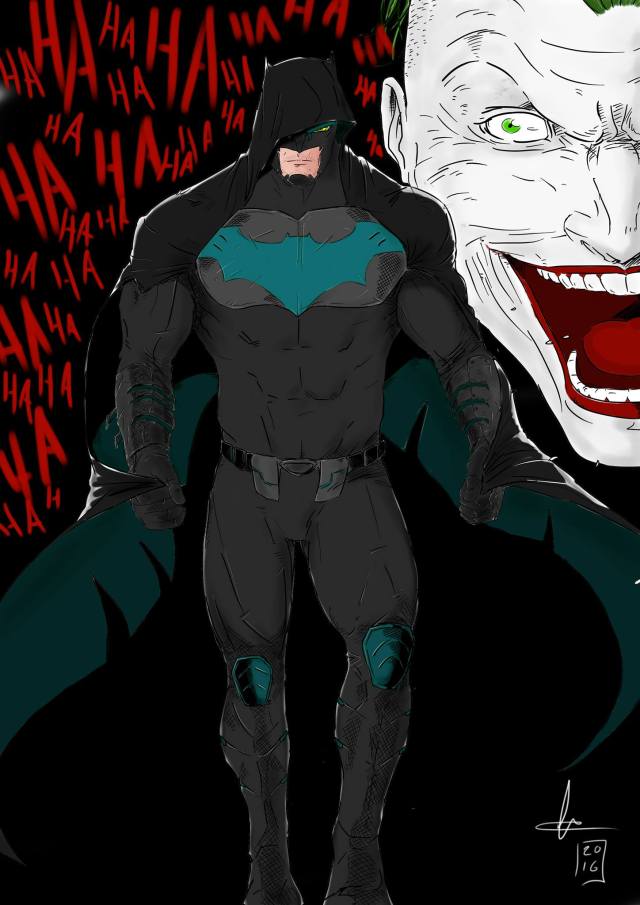
Batman Haunted by the Joker. Paulos Kiziridis, 2016.
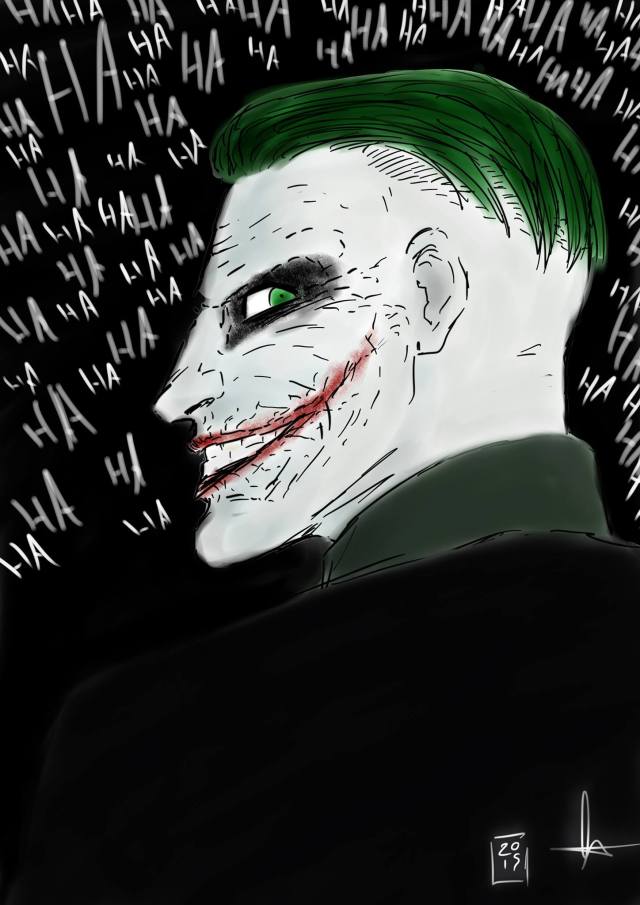
The Joker. Paulos Kiziridis, 2015.
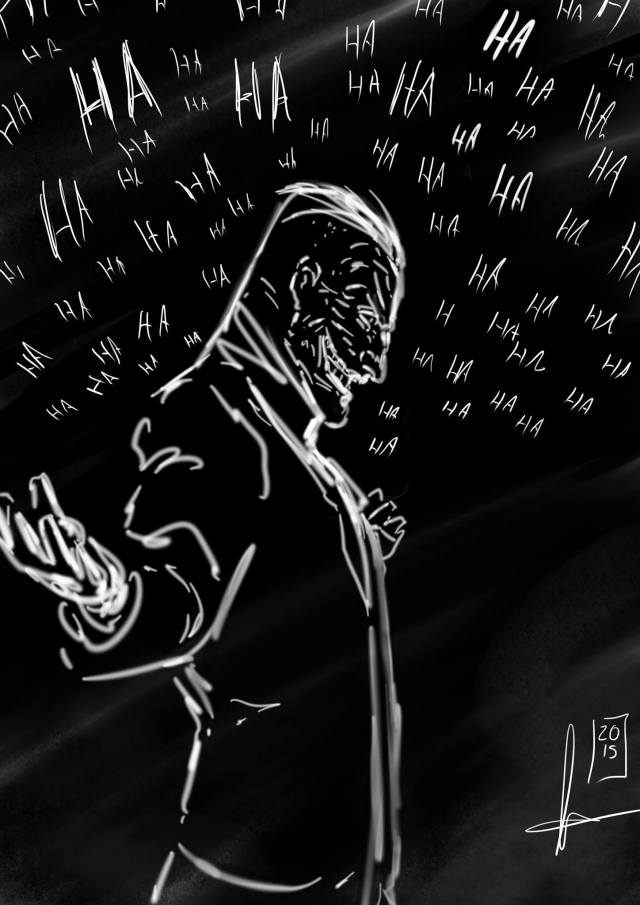
The Joker. Paulos Kiziridis, 2015.
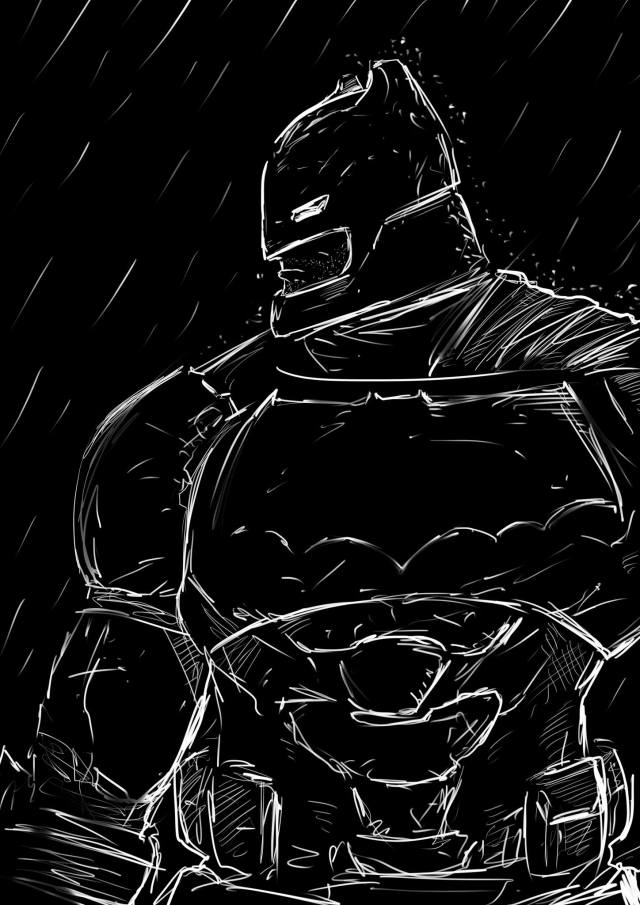
Batman. Paulos Kiziridis.
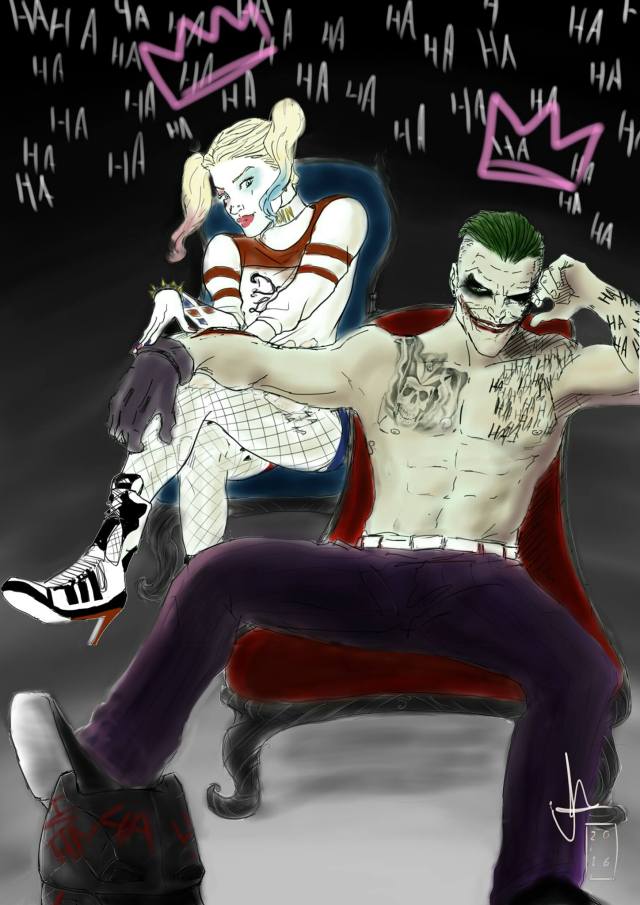
The Joker and Harley Quinn. Paulos Kiziridis, 2016.
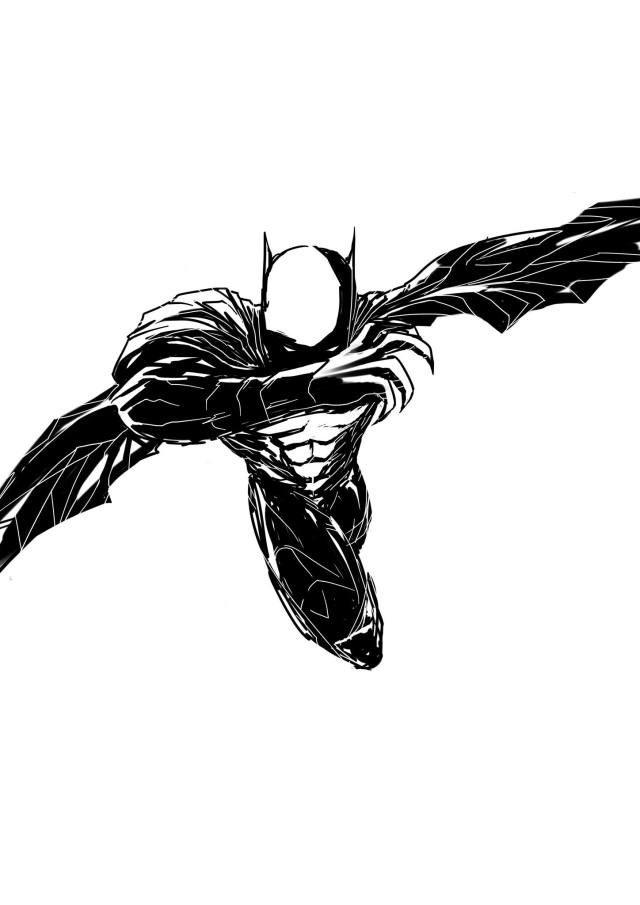
The Dark Knight. Paulos Kiziridis.
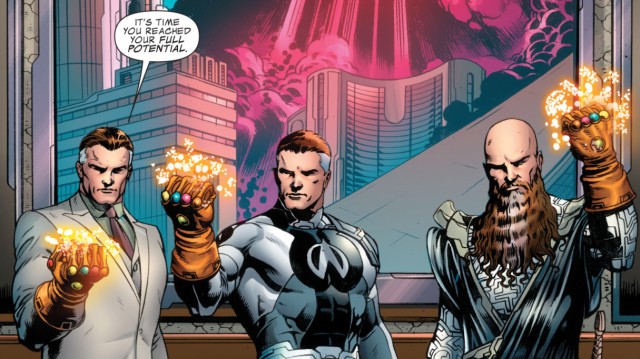
Reed Richards in front of the Council of Reeds (Fantastic Four #570)
Hello once again from your friendly neighbour, the ComicBook Imperative Guy. My new post is one of the reasons why I wanted to create this blog. This was the first connection between comicbooks and philosophy that I was passionate about. As I point out in the title of this entry, this is only the first part of the connections of Transhumanism with popular culture that I want to explore. It is certainly going to be a reoccurring theme in this blog.
Everything started with a course on Bioethics. The wondrous world of Bioethics has been really appealing to me since the very first moment (as is every connection of philosophy and science) because it reminded me of the adventurous worlds that I explored in comicbooks. This was the first time that philosophy excited not just the adult university student in me that was working on his field of study, but also the little kid with the vivid imagination. The field of Bioethics offered me a world where philosophy, science, biotechnology and comicbooks were interconnected in ways that I could not have imagined possible. As I continued studying the different aspects of Bioethics, I came across the movement of Transhumanism. Transhumanism became an integral part of my academic career, but I always wanted to connect its core ideas with their representations in popular culture.
What is the Transhumanist movement? Transhumanism is a philosophical, scientific and cultural movement that embraces the new and speculative biotechnologies in order to set the human kind free of its biological chains, put us in charge of our evolution towards a trans- and post- human life. The apologists of the Transhumanist movement pose certain questions: Wouldn’t life be better if we live longer and healthier lives? Wouldn’t it be amazing to be able to remember every single thing that we have read or experienced? Wouldn’t everything be better if we enhance our abilities or even create new ones? Wouldn’t it be phenomenal for us to be able to control our emotions and reject every single emotion that makes us unhappy? All these questions make us think of an imaginary state of bliss for the human kind. A world of fantastic men and women who can do anything. They can experience life in ways that we cannot even imagine with our limited point of view. Human kind will not be chained to its Homo sapiens state. but it will be able to control evolution towards transhuman and posthuman modes of being. Essentially, the transhuman will be the intermediate state between Homo sapiens and the shrouded in mystery posthuman.
The Transhumanist movement of course does not have just one aspect and the different philosophers, scientists and politicians have created their own versions of it. The Trashunmanistic prospect of being, though, sounds more like a biotechnological utopia rather than a potential future state of mankind. I think it is interesting though to examine the relationship between the basis of the Transhumanist movement and its representation in popular culture. Specifically, Reed Richards (Mr. Fantastic) from the Fantastic Four and the Future Foundation storyline of Jonathan Hickman.
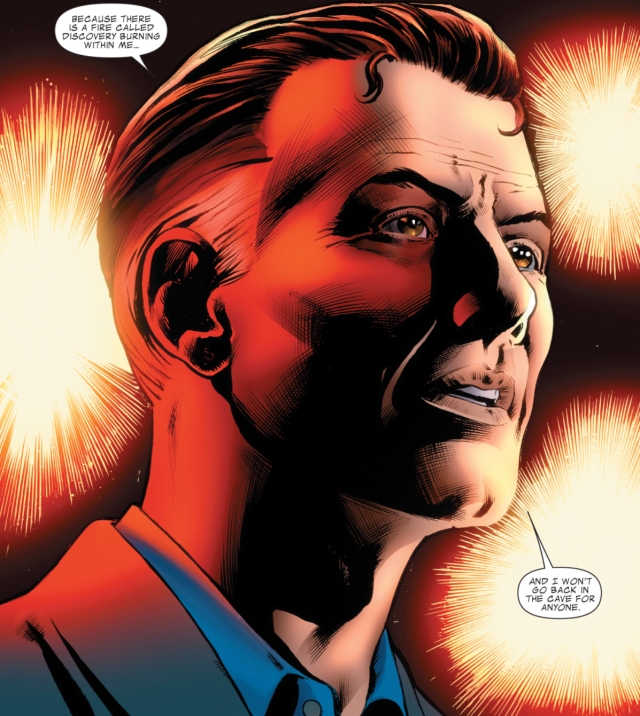
Mr. Fantastic during his speech at the 2010 Singularity Conference (Fantastic Four #579)
Jonathan Hickman’s run of the Fantastic Four has been my favourite storyline of Marvel’s original superhero team. Even though Hickman’s run is mostly based on Franklin Richards’ (Reed and Sue’s son) journey, one of the secondary stories is Reed’s deeply rooted desire of finding the solution for everything. Finding the solution for every single problem. Reed’s desire is connected to his traumatic relationship with his father which is an overreaching arc of Hickman’s run. One of the basic forces behind the emotional journey in Hickman’s run is the exploration of the father-son relationship. Reed feels compelled to put his brilliant mind at work because he promised his father that he would be better at it. He would work harder. He would make the world a better place.
His first attempt to fulfill his promise to his father was to create a machine that would provide to him the necessary answers towards solving humanity’s problems. The most important question asked to this machine by Richards was who else made the same choice with him? Who else tried to solve every single problem for humanity’s sake? This led Richards to a multiversal council of Reeds. A council that would roam the Marvel multiverse in order to eradicate every villain that spread chaos and that would actively work on solving every problem (for example hunger) and that would shape humanity’s future. Mr. Fantastic’s exploration of the limits of his ego, intelligence and narcissism was cut short because of an attack of the mad Celestials (for more information on the actual story, please read the whole story, here).
Richards, coming close to his death by the attack of the Celestials and having to face a life without his family and friends, had he chosen the life on the council of Reeds, tried to find a different way of solving every single problem. Reed Richards’ plans for the future are revealed in a fiery speech during the 2010 Singularity Conference in Golden, Colorado. He started by stating that his dream for that conference was not only to examine the problems they currently have to confront, but also to “aggressively look into the future… to envision the direction the humanity should be heading… and boldly steer us there”, (Fantastic Four #579). Reed’s expectations though were not met by his peers. Reed went on with his speech by rejecting every single contribution made by his peers (except the one made by Jennifer Walters or She-Hulk). He argued that all of them were uninspiring, conservative, that they held on to a anachronistic point of view, that they were politically charged instead of working in the name of science and working in the name of shaping the future. He discarded his peers and their contributions. He rejected all of them saying that they are too old to envision and work towards the realization of a new, man-made future.
Richards, on the other hand, is not going to let this opportunity to pass him by. In this pivotal point in human history he is determined to be one of the great explorers, he is determined to go down in history and not end up like all of them. Richards is sure that all of them have nothing to offer anymore to the scientific community and the world in general. He is about to embark a new journey of an ongoing education, a journey with a younger generation, a generation that is focused on asking questions and providing groundbreaking answers. Answers that are not intertwined with politics, skepticism over the scientific discoveries and I would add, philosophical thought. Reed Richards created the Future Foundation in order to solve every problem and shape the future of mankind. The creation of the Future Foundation is Richards’ second attempt to fulfill the promise he made to his father.
One of Hickman’s greatest achievements is the fact that he was able to create a very complex character for Reed. Richards is not just a superhero or a scientist. His complex personality is flooding every aspect of his existence in a defining way that affects the roles that he has taken up during his lifetime (a son, a scientist, a friend, a husband. a father). His vague question for a formula that would solve humanity’s problems, for me, show his inability to understand human nature at its core and the necessity of the existence of problems/evil. His techno-favourable form of utilitarianism is projected through a quest for a materialistic happiness that can only be achieved with the help of technology.
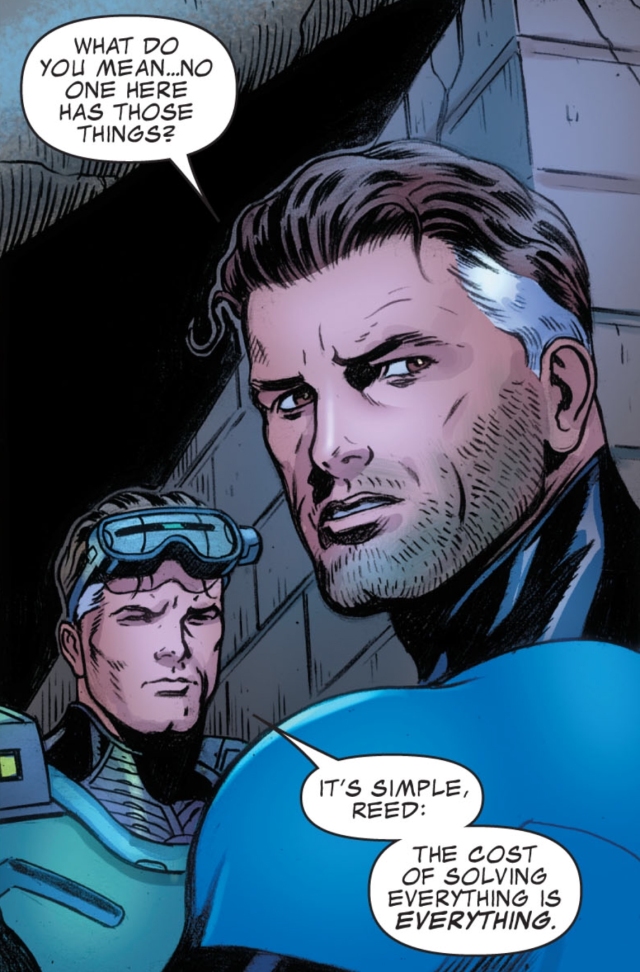
“The cost of solving everything is everything.” (Fantastic Four #572)
The core problem of Richards’ approach is the fact that he is not able to recognize the different layers of human existence. Even though the quest of happiness is a staple throughout human history, we have to understand that a materialistic approach cannot merely cover the complexity of this issue. One of the decisive factors against that worldview is that it implies an intrinsic inequity between those who will be able to access these technologies and those who will not be able to do it. This is something that cannot be avoided and both Transhumanism and Reed seem to want to move past it without much discussion of the real repercussions of a fragmented society. Another issue that comes to mind with Reed’s decision to establish the Future Foundation is the fact that children will not be as alert to the issues emerging from the discussion of taking charge the human evolution. He swiftly judged his peers for lack of imagination, politics and overall conservatism, but he did not address any of the issues they raised. He simply disregarded them and decided to create the Future Foundation as an institute that would be focused on science in the name of science. We have to wonder, though, what is the meaning of science if it does not serve humanity?
On another level, what Transhumanism and Reed Richards imply is that humanity can fulfill its potential by finding ways to conquer evolution, to shape the future as they desire, to stop every kind of bad emotion in the name of happiness. Transhumanism and Mr. Fantastic, even though they understand very well the complexities of science and technology, seem to fall short when it comes to mankind. It is throughout the constant change between good and bad, pleasant and unpleasant that we can find meaning in these states. Transhumanism and Reed Richards promise something they cannot deliver. Happiness is meaningful only when we follow the necessary journey towards achieving it. It is not a moment in the time and space continuum. True happiness cannot be achieved by technological and chemical configuration. It is an ongoing and never-ending process of working hard, riding the highs and surviving the lows. And in that sense, Transhumanism and Reed Richards do not really set mankind free from its current state, but they merely create new chains for it (the dependence on the different biotechnological applications that will provide the enhancements, the chemical implementation of happiness, so on and so forth).
Join in the debate!
George
The ComicBook Imperative Guy
P.S. Find us on Facebook on our new page: https://www.facebook.com/thecomicbookimperative/
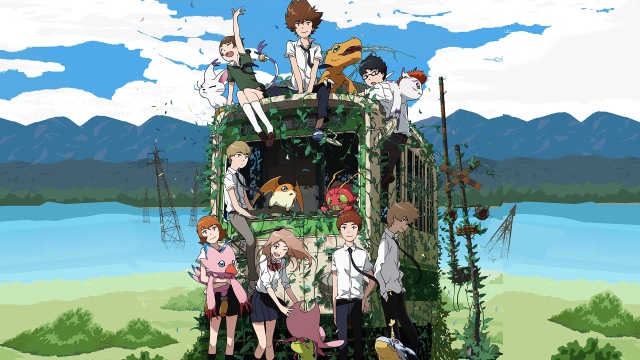
With the premiere of the fourth instalment of the Digimon Tri series, named Loss (喪失 Sōshitsu), I wanted to write about Digimon and the thrill of reviving a much beloved show in the right way, at the right time and for all the right reasons. Firstly, I have to admit that I have been a huge fan of the original Digimon series. For anyone who doesn’t know what this series is about, I will say that it is the journey of eight kids from Japan (the DigiDestineds) who travel in a digital world full of magical creatures that awaited their arrival for a long time. As these kids find their Digimon partner, they embark on a journey that will change their lives forever in ways they could never have imagined that it could be possible. Saving both the digital and our world several times and with the end of the second season our heroes have to part ways from their Digimon partners. Toei Animation, wanting to celebrate the fifteenth anniversary of the Digimon franchise, decided to produce a six-part series in order to tie it with the first two original seasons of the series. The series take place only three years after the events of Digimon Adventure 02 and the DigiDestineds find themselves in a situation where they have to fight again in order to restore the balance both in the digital and our world.
As the story is still going on and we do not really know towards where it’s headed, I decided to write about what I found truly astonishing in the story so far (even though I do promise to revisit the series in its entirety, once it’s concluded). What strikes me the most about this new adaptation is the fact that the creators did not shy away from the aftermath of the adventures and how they affected our heroes. I do believe that shows like Digimon that mainly aim towards younger audiences tend to shy away from the real-life difficulties that derive from situations like the ones the eight DigiDestineds had to face. Unfortunately, by doing that they lose an immense part of the emotional growth of these adventures, as well as the consequences of having to go back to what is considered to be a normal life.
That was never though the case with Digimon. Having been often (and unjustly) compared to Pokémon, Digimon has always been far superior. Even though elements of the story have been similar (as is with every other “Collectible Monsters” series), Digimon was able to surpass the superficiality of the Pokémon narrative and created a deeply emotional world. The creators were not confined to a certain trope of exploring the DigiWorld, but what they wanted was to deliver an adventure that was not just fun and games, but also a journey of self-discovery, friendship, struggle, courage to fight even if the odds are against you and emotional growth.
I was really happy to discover that these attributes that make the story of Digimon so unique were carried on to the new Digimon Tri adaptation. Having watched the first three parts of the six-part series, I found myself in the same place I was as a child watching Digimon fanatically. What was truly astonishing though was that I was not the only one who had changed. It has been a long time since I was nine or ten years old watching Digimon and wishing I could be a part of this story. Sooner or later real life kicked in and I had to be a part of it. I had to be a part of it for all the good and the bad stuff. My struggles growing up though did not alienate me (or any of us, I believe) from the series. I actually think that the connection became stronger because of the fact that it was not just me (or us) that we grew older, but it was the show as well. The creators did not try to recapture the magic and the innocence of the original series (that would be impossible anyways), but they followed their audiences to their journey. Taichi “Tai” Kamiyaand the rest of the DigiDestineds had to grow up as well. Torn between their experiences in the digital world and the reality of their life as normal teenagers, they are not the same people they used to be. And that is okay. Because the people that grew up with them are not the same as well. Creatively it was a bet that seems to have paid off.
One of the central arcs of the revival is the struggle to come to terms with what they have done over the course of their journey, where they are now and where will they end up in the future. As I said in the beginning of this post, we do not have the full story in our hands right now, so I will focus on the re-introduction of two of the main characters: Taichi “Tai” Kamiyaand and Joe Kido. I do want to come back and examine the journey of other characters as well, and I will once the story is complete.
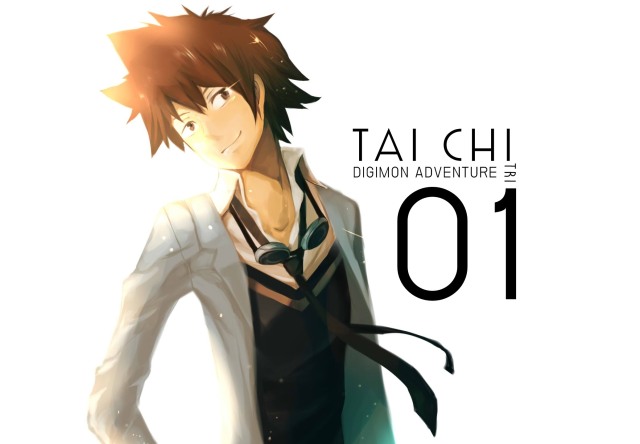
I want to start with Tai, since he has been the leader of the group. As a young boy he was courageous, loud, he would jump head first to every danger, if that meant he could save his friends. Tai was paired with Agumon and together they fought their way out of many situations making them the heart of their group. Tai’s transformation in the Digimon Tri series must be the most radical out of them all. When we meet up with Tai again he is overwhelmed by the issues of his age (drifting away slowly from his old group of friends, adjusting to the life of being a teenager), until a weird disturbance brings forth one of his first foes at the digital world, Kuwagamon. Kuwagamon’s arrival is soon followed by Tai’s partner, Agumon, with every intention to fight the first one back to the digital world. What is new, though, is that we see Tai no longer diving head first to the battle. His excitement to fight, a basic trait of his personality, is now lost in the fear of what his actions as a DigiDestined will do to his world. Tai faced the destruction of the collision of his world and the digital world (for example the events of the “Eighth DigiDestined” arc, when Myotismon and his dark army invaded Odaiba, Japan) and he is paralyzed by the fear of that happening again.
His newfound fear of battle has been a great way to reintroduce Tai’s character fifteen years after we first met him on that summer camp. This narrative gives the chance to the writers a way to explore Tai’s troubled psyche. The trauma of fighting during the events of Digimon Adventure and Digimon Adventure 02 are prominent and Tai has to find a way to overcome it by working hard and reaching out to the only people that can understand him, the other DigiDestineds. What is really interesting is that Tai does not seem ready to do it. He cannot reach out to his friends, he cannot come to terms with what he had to do as a DigiDestined. The fact that Tai cannot accept what he had done in the past is also a major aspect of his inability to reach out properly to his friends and especially to Yamato “Matt” Ishida with whom he had the most intriguing relationship in the original series. Tai has to forgive himself and work through his fear by accepting that his responsibility is to be a part of this group in order to protect both the digital and the real world.
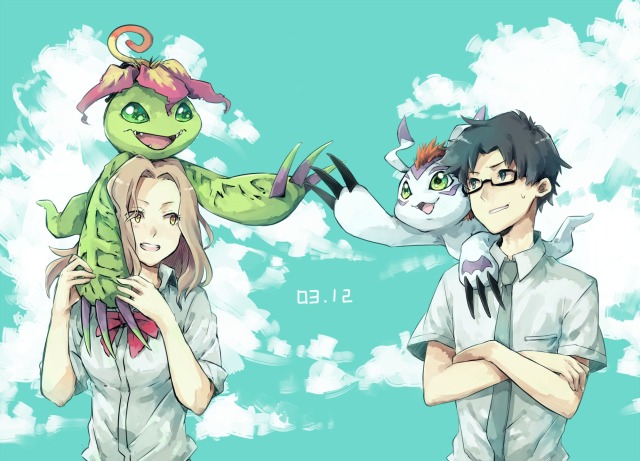
The other character that seems to be overtaken by his struggle in the real world is Joe Kido. Joe had always been the voice of reason of the group. The one that was responsible for the safety of the other seven DigiDestineds. Joe had been a frantic, but reliable character since the beginning. He always exclaimed that his priority was studying in order to become a doctor (something that his parents always wanted for him). We meet Joe again as he is struggling and failing to prepare for medical school. He is solely devoted to his studying and ignores both his friends and his responsibilities as a DigiDestined. I have to admit that Joe (and his partner Gomamon) has always been my favourite characters in the show. Joe never saw the real power in him and that made him a force that was not as reckoned as he should have been. He never gave enough credit to himself.
Joe, as Tai (and everyone else for that matter), has changed a lot since his time at the digital world. Even though Tai has changed drastically since the last time we saw him, Joe’s struggles seem to be consistent with his general character. Joe closed himself off by putting forth the front of getting accepted in medical school and pleasing his parents. This is only part though of what is going on with Joe’s psyche. Joe is still struggling with his self-esteem and he cannot find the reason why he is part of that group. Why he had to be the one that has to fight? He is not accepting his responsibility not out of fear of what might happen to his world (as is with Tai), but because he does not understand why he was chosen in the first place. Joe’s journey in Digimon Tri is one of appreciating his power and using it in order to restore the order in both worlds.
Digimon Tri was able to deliver a great story (a story that is still moving forward) and to celebrate its fifteenth anniversary in a way that only enriches the original series. All the DigiDestineds have to face their lives as normal teenagers (with everything that comes with it), but also to be brave enough to save the digital and the real world one more time. The thrill of going back to a world that you know so well would be enough to make Digimon Tri a success, but by adding to that mix the aftermath of an adventure was something that every fan can cherish. The deep emotional stakes of their struggle to better understand themselves and the world they are living in is something that every person on this planet can relate to.
So, I would like to urge each and every one of you to watch the new Digimon Tri series, relive the magic of the adventure in the digital world and to delve into the emotional world of the DigiDestineds.
I would love to read your thoughts on that subject!
George
The ComicBook Imperative Guy
You must be logged in to post a comment.